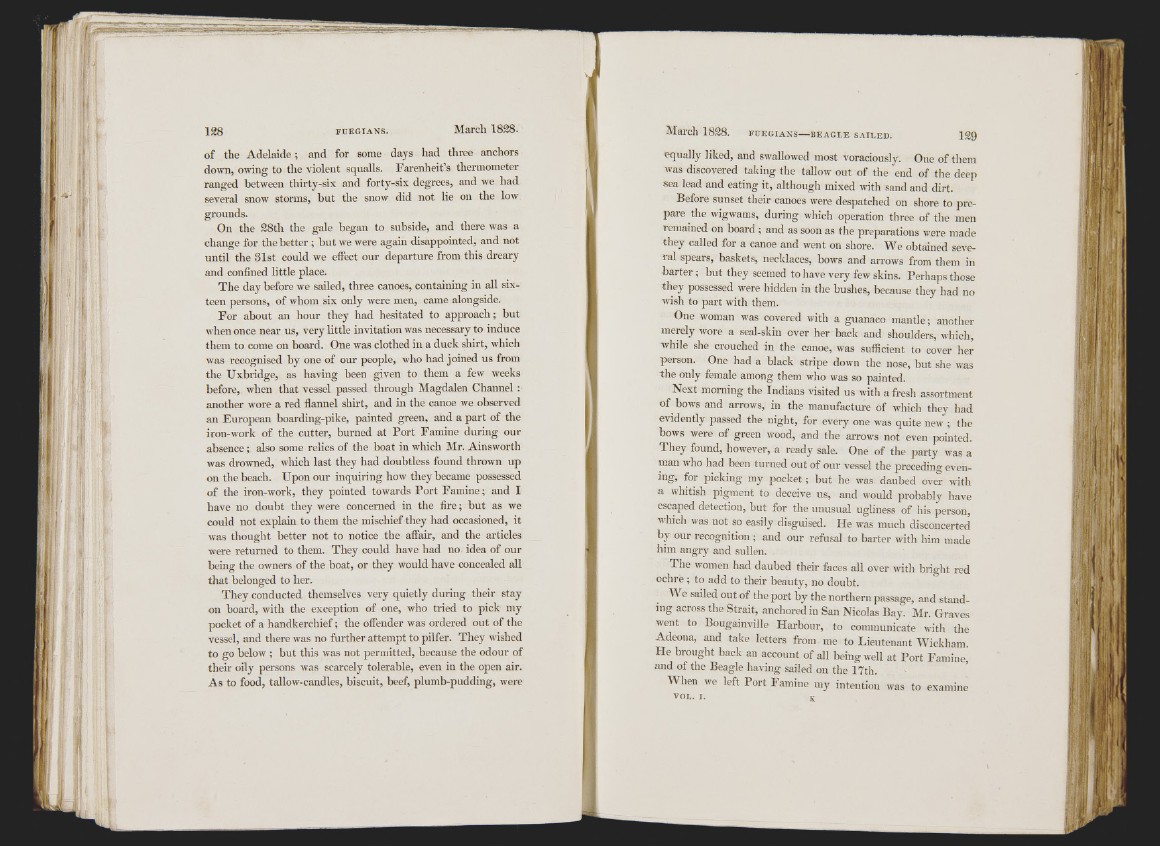
iü iOto*:
L
128
of the Adelaide; and for some days had three anchors
doivn, owing to the violent squalls. Fai'enheit’s thermometer
ranged between thirty-six and forty-six degrees, and we had
several snow storms, but the snow did not lie on the low
grounds.
On the 28th the gale began to subside, and there was a
change for the better ; hut we wei-e again disappointed, and not
until the 31st could we effect our departure from this dreary
and confined little place.
The day before we sailed, three canoes, containing in all sixteen
persons, of whom six only were men, came alongside.
For about an hour they had hesitated to approach; but
when once neai- us, very little invitation was necessary to induce
them to come on board. One was clothed in a duck shirt, which
was recognised by one of our people, who had joined us from
the Uxbridge, as having heen given to them a few weeks
before, when that vessel passed through Magdalen Channel :
another wore a red flannel shirt, and in the canoe we observed
an European boarding-pike, painted green, and a part of the
iron-work of the cutter, burned at Port Famine during our
absence; also some relics of the boat in which Mr. Ainsworth
was drowned, which last they had doubtless found thrown up
on the beach. Upon our inquiring how they became possessed
of the iron-work, they pointed towards Port Famine; and I
have no doubt they were concerned in the fire; but as we
could not explain to them the mischief tliey had occasioned, it
was thought better not to notice the affair, and the articles
were returned to them. They could have had no idea of our
being the owners of the boat, or they would have concealed all
that belonged to her.
They conducted themselves very quietly during their stay
on board, with the exception of one, who tried to pick my
pocket of a handkerchief; the offender was ordered out of the
vessel, and there was no further attempt to pilfer. They wished
to go below ; but this was not permitted, because the odour of
their oily persons was scarcely tolerable, even in the open air.
As to food, tallow-candles, biscuit, beef, plumb-pudding, were
equally liked, and swallowed most voraciously. One of them
was discovered taking the tallow out of the end of the deep
sea lead and eating it, although mixed with sand and dirt.
Before sunset their canoes were despatched on shore to prepare
the wigwams, during which operation three of the men
remained on boai-d ; and as soon as the preparations were made
they called for a canoe and went on shore. We obtained several
spears, baskets, necklaces, bows and a n w s from them in
barter; but they seemed to have very few skins. Perhaps those
they possessed were hidden in the bushes, because tliey had no
wish to part with them.
One woman was covered with a guanaco mantle; another
merely wore a seal-skin over her back and shoulders, which,
while she crouched in the canoe, was sufficient to cover lier
person. One had a black stripe down the nose, but .she was
the only female among them who was so painted.
Next morning the Indians visited us with a fresh assortment
of bows and arrows, in the manufacture of which they had
evidently passed the night, for every one was quite new ; the
bows were of green wood, and the aiTows not even pointed.
They found, however, a ready sale. One of the party was a
man who had been turned out of our vessel the preceding evening,
for picking my pocket; but he was daubed over with
a whitish pigment to deceive us, and would probably have
escaped detection, but for the unusual ugliness of his person,
which was not so easily disguised. He was much disconcerted
by our recognition ; and our refusal to barter with him made
him angry and sullen.
Tlie women had daubed their faces all over with bright red
oclire; to add to their beauty, no doubt.
W e sailed out of the port by the northern passage, and staud-
mg across the Strait, anchored in San Nicolas Bay. Mr. Graves
went to Bougainville Harbour, to communicate with the
Adeona, and take letters from me to Lieutenant Wickham
He brought back an account of all being well at Port Famine,
and of the Beagle having sailed on the 17th.
AVhen we left Port Famine my intention was to examine
VOL. I . K
r-'" I !